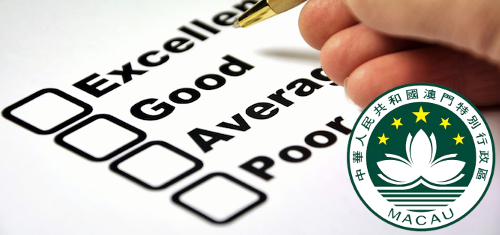 Macau’s mid-term review of its gaming market proved anti-climactic for casino operators while promising ever more scrutiny on “problematic” junket operators.
Macau’s mid-term review of its gaming market proved anti-climactic for casino operators while promising ever more scrutiny on “problematic” junket operators.
On Wednesday, Macau’s government delivered the results of its year-long examination of its casino operators, whose gaming licenses will be up for renewal in two bunches in 2020 and 2022. However, the government said the review had no direct bearing on the renewal process and was more focused on ways to optimize Macau’s casino market.
At a press conference on Wednesday, Lionel Leong Vac Tai, Secretary for Economy and Finance, was joined by Gaming Inspection and Policy Coordination Bureau (DICJ) chief Paulo Martins Chan to announce the review’s findings. Leong said all six Macau casino concessionaires had lived up to the obligations in their initial pacts.
Leong said Macau’s market had developed largely on the strength of the VIP sector, but times change – oh, how they change – and Macau “cannot only depend on a small number of customers to generate most of the revenue. We need to have new clients.”
Leong claimed Macau operators’ non-gaming amenities generated revenue of $2.9b in 2015, which he said put Macau tourists’ non-gaming spending on a level “comparable to that of Las Vegas.” However, Leong likely raised eyebrows among operators when he said non-gaming’s share of Macau’s overall revenue was “diluted as Macau’s gross gaming revenue is far too high.” For the record, Macau’s recent monthly revenue totals are half of what they were just two years ago.
JUNKETS WIN SOME, LOSE SOME
As for junkets, the government said the sector was still plagued by “problematic areas,” including junkets wielding “excessive bargaining power” in their dealings with casino operators, junkets’ willingness to adhere to regulations in issuing credit to customers and the prevalence of off-the-books ‘side betting’ in VIP rooms.
The DICJ launched a separate review of its remaining junket operators this year that has so far surveyed over 80 operators. The DICJ expects to wade through the rest of the surviving junkets’ books within the previously announced six-month timeframe.
Chan confirmed that junkets would face an increased financial “entry threshold,” which the DICJ hopes will ensure greater stability among the junkets that weren’t forced to close their VIP rooms as the market tightened. No specifics on this new threshold were offered on Wednesday, but previous reports suggested a tenfold increase in capital requirements for new junkets.
On the plus side, Macau appears amenable to finally granting junkets their long desired blacklist of deadbeat VIPs. Chan said plans were still at a “preliminary stage,” but the DICJ now considers the creation of a list of gamblers with outstanding junket debts a “viable” option.
Creating such a list will require amending Macau’s personal data protection laws. Earlier this week, Fong Man Chong, coordinator of the Personal Data Protection Office, said the issue still needed to be studied in depth, including who would have access to the list.






